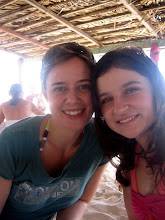 Joana and Manuela are clearly serious about their work
Joana and Manuela are clearly serious about their work Obviously, Galina and Robson also take the project seriously
Obviously, Galina and Robson also take the project seriouslyCEDEFAM, a satellite of UFC medical system in our favela, does some pre-natal and preventative care. One remarkable thing about it is the jardim medicinal (medicinal garden). Yes, they grow some of their own meds.
 medicinal garden at a university satellite location
medicinal garden at a university satellite locationIronically, even without proper sanitation, the residents in Fortaleza’s favelas may actually get better preventative care than some of the communities in the US. The whole city is divided into areas, all of which have nursing posts where the residents can get immunizations and some health care for free. There are other community-based prevention programs, such as exercise classes for the elderly, which our grandma cannot stop raving about. And of course, there are social events, like dancing for the elderly (mental health?). So while the favelas have many problems, the kids’ immunizations are up-to-date. Meanwhile C’ville still has annual Pertussis outbreaks. Must be the price we pay for being the individualist-driven society… Why can’t we just put a little money (and enforcement) into preventative, community-based health care? Our system of health-department-employees-going-door-to-door-in-poor- neighborhoods-for-free-on-their-own-time is getting old.
On a side note, the favela kids get really excited about seeing foreign, white people in their neighborhood. Yay us!

No comments:
Post a Comment